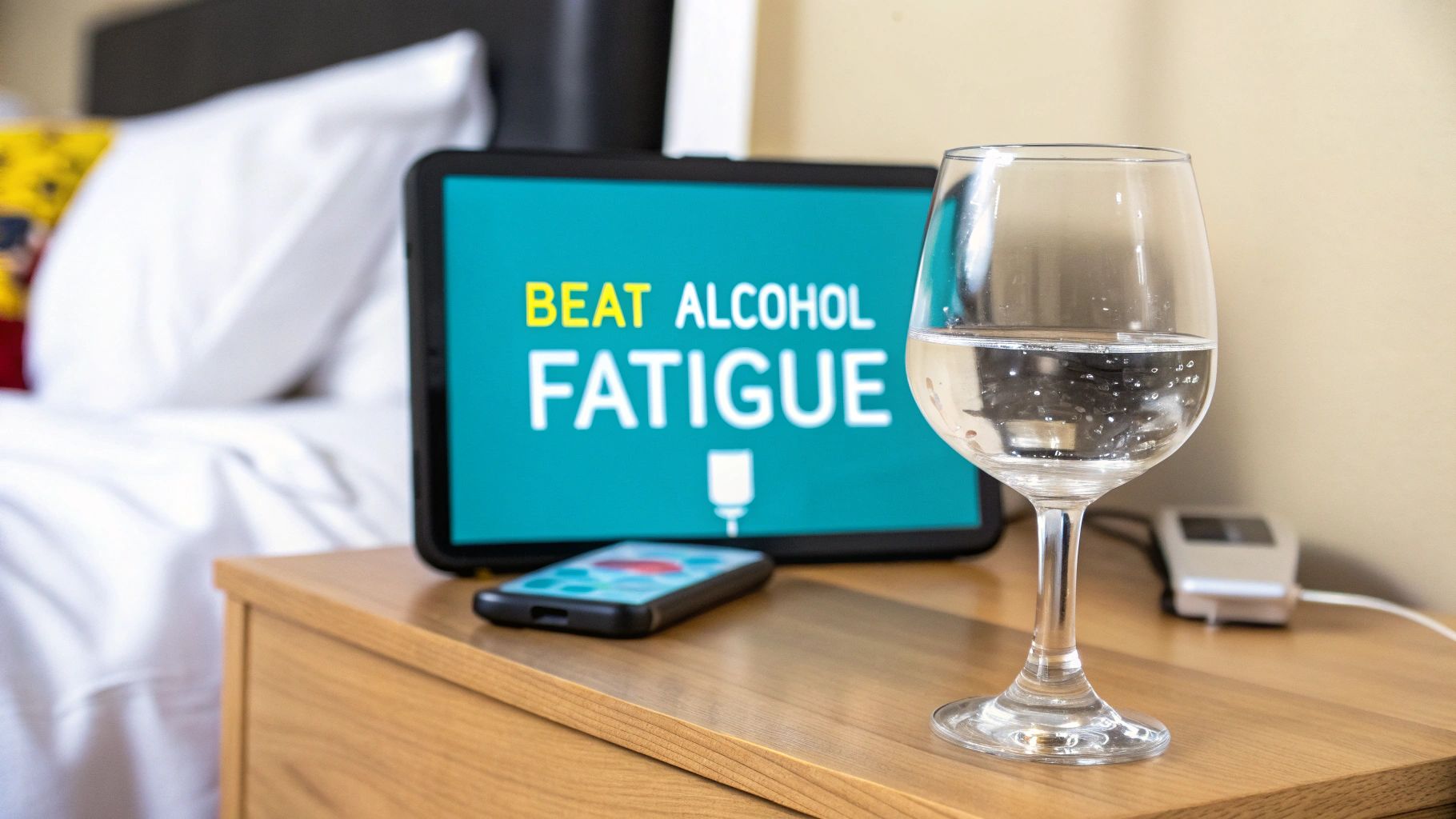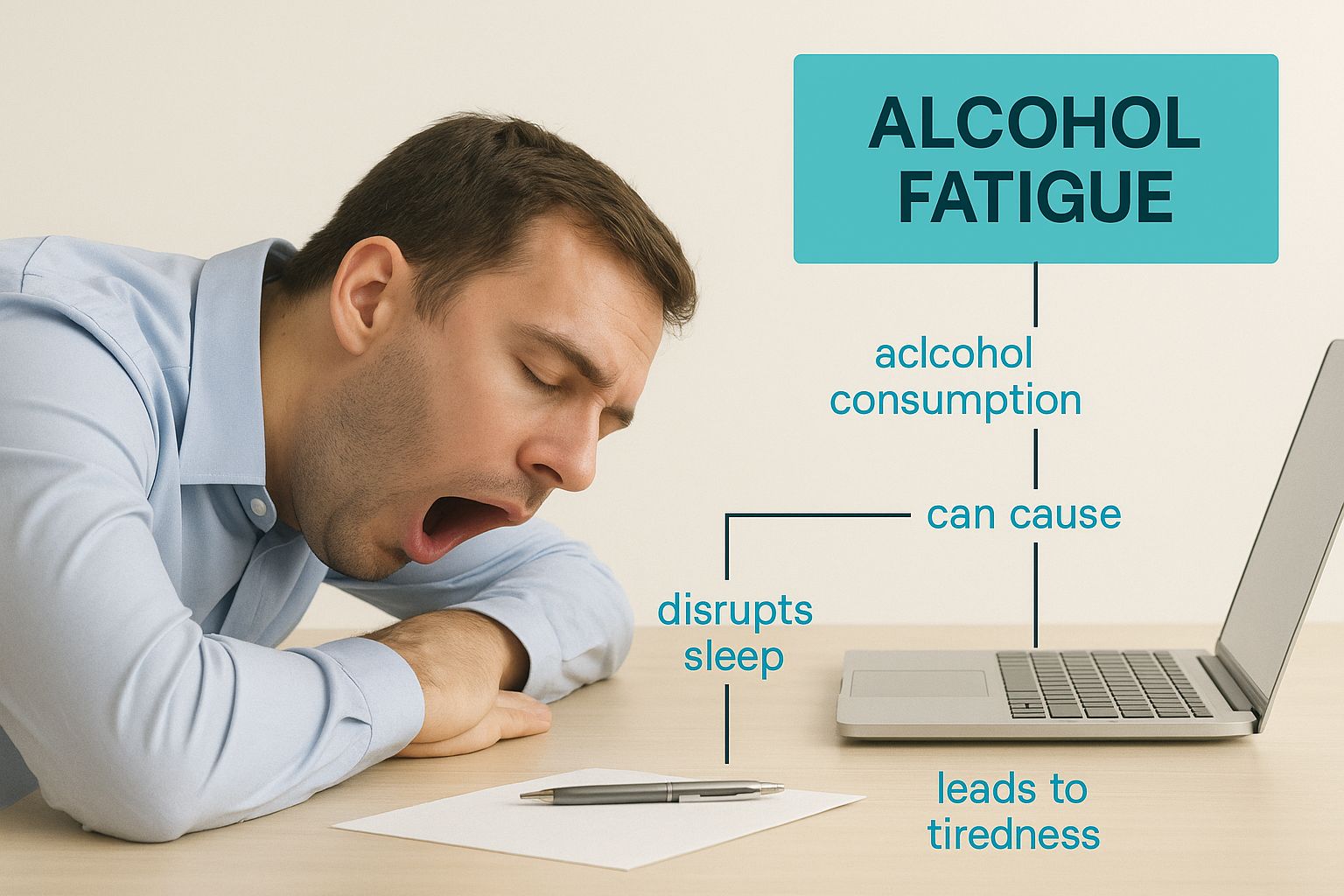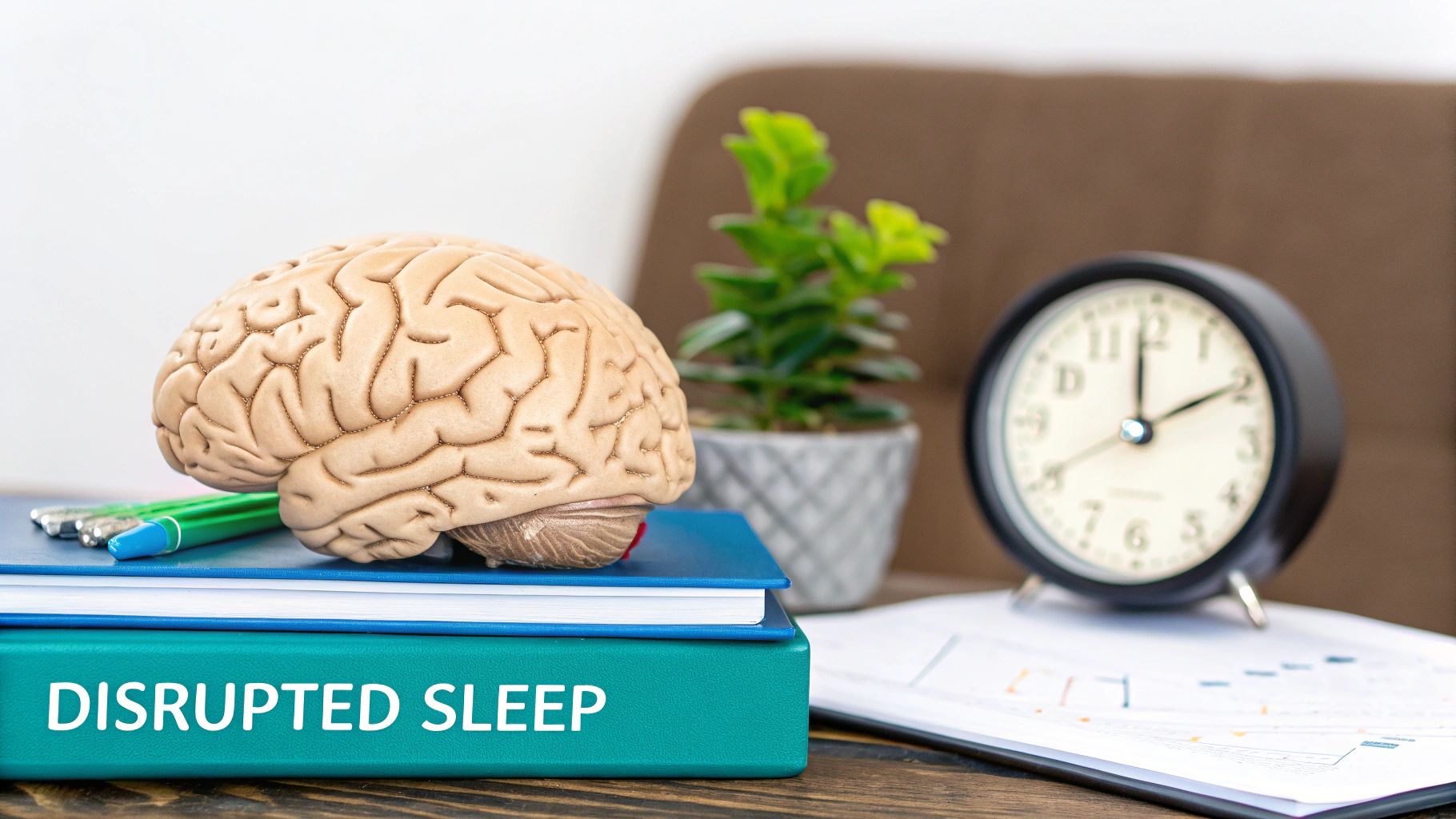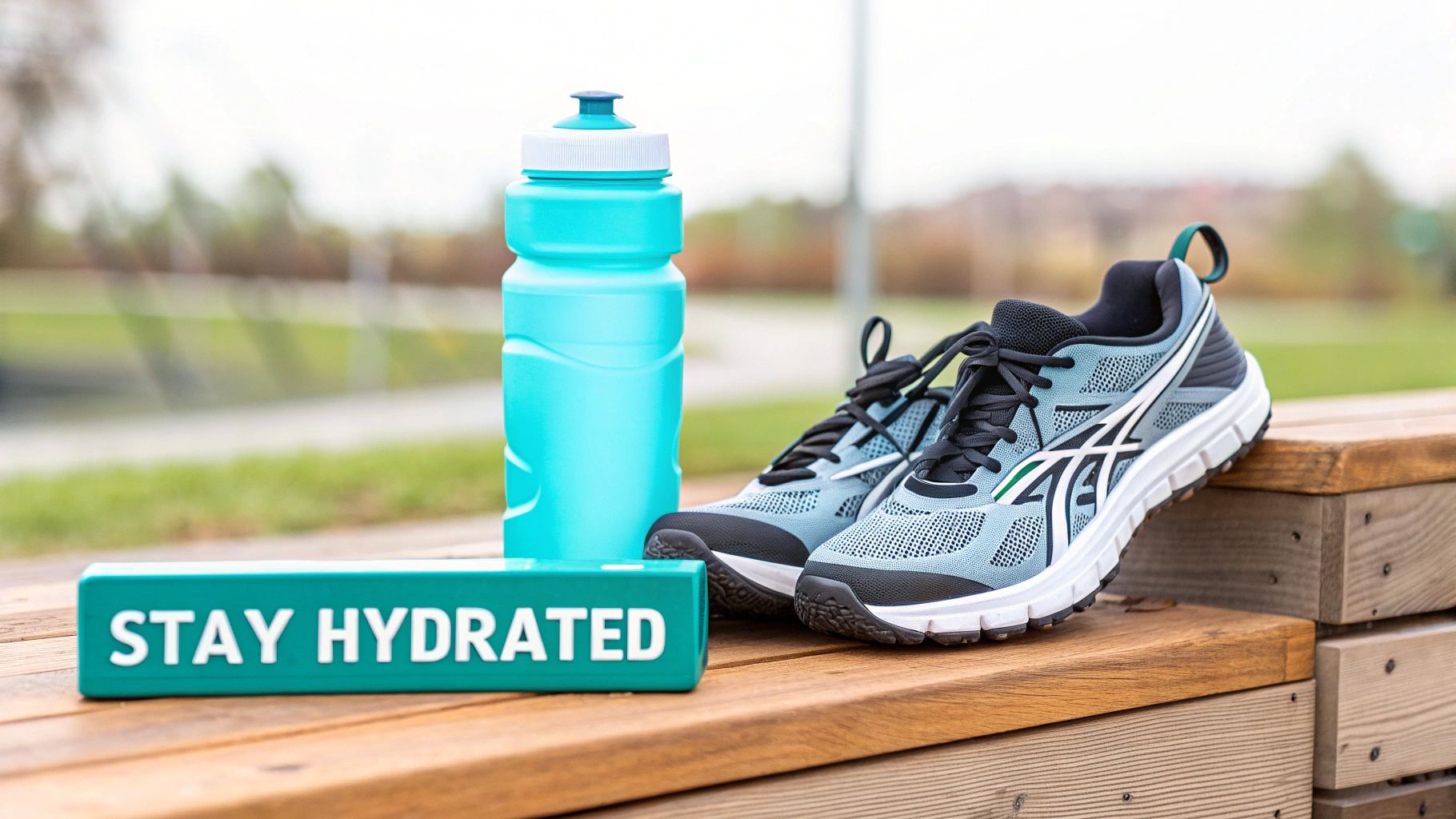

· By Annemarie
Understanding Fatigue from Alcohol and How to Prevent It
That drained, exhausted feeling after a few drinks isn't just in your head. Alcohol is a central nervous system depressant, which is why it can make you feel sleepy at first. But don't let that initial drowsiness fool you.
The real problem is that alcohol significantly disrupts your restorative sleep, especially the crucial REM phase. This is the main reason you can feel so tired even after what felt like a full night in bed.
Why Alcohol Leaves You Feeling So Drained
Ever had a drink or two, felt your eyelids get heavy, only to wake up a few hours later feeling restless and wide awake? It’s a classic story, and it's the key to understanding why alcohol makes you so tired. That initial sedative effect is short-lived and creates a false sense of relaxation.
Think of it like a faulty phone charger. You plug it in, the screen lights up, and it looks like it's working perfectly. But in the morning, you wake up to a battery that’s barely charged. Alcohol does something very similar to your brain and body. It might help you fall asleep faster, but the quality of that sleep is seriously compromised.
The Sleep Rebound Effect
As your body gets to work metabolizing the alcohol overnight, that initial calming effect wears off. This triggers a "rebound" where your nervous system kicks back into high gear, becoming more active than before. This rebound is exactly what leads to fragmented sleep, frequent wake-ups, and a major drop in restorative REM sleep.
REM (Rapid Eye Movement) sleep is when the magic happens. It's the stage where your brain consolidates memories, processes emotions, and truly recharges for the next day. When alcohol suppresses it, you wake up feeling mentally foggy and physically exhausted, no matter how many hours you were technically asleep.
This sleep disruption is the number one culprit behind that next-day grogginess. Fatigue is one of the most commonly reported symptoms after drinking, all thanks to these depressant effects. In fact, research shows that even moderate alcohol intake before bed tanks your sleep quality and cranks up next-day fatigue, which in turn impairs your focus and alertness. For more on shifting alcohol trends and their impact, you can check out this official report.
It's More Than Just Poor Sleep
While messing with your sleep is a huge part of the problem, it’s not the only reason you feel so drained. The simple act of breaking down alcohol demands a ton of energy and resources from your body, which adds to that overall run-down feeling.
To put it all together, the relationship between alcohol and your sleep is complicated. It might seem like a sleep aid, but it's really a sleep saboteur.
The table below breaks down the key ways alcohol interferes with your rest.
| How Alcohol Disrupts Your Sleep Cycle | | :--- | :--- | | Disruption Factor | Impact on Sleep Quality | | Suppresses REM Sleep | Cuts short the most mentally restorative phase of sleep, leading to mental fog. | | Causes Nighttime Awakenings | The "rebound effect" leads to a lighter, more fragmented second half of sleep. | | Worsens Dehydration | As a diuretic, it can cause you to wake up from thirst and disrupt sleep further. |
So, what you end up with is a perfect storm for fatigue: poor-quality sleep combined with the metabolic strain of your body working overtime. Understanding this is the first real step toward learning how to prevent it.
The Hidden Causes of Post-Drinking Exhaustion
Ever notice how after a night of drinking, you feel a kind of exhaustion that goes bone-deep? It's more than just feeling a little tired from being out late. While poor sleep is a huge part of the problem, the fatigue from alcohol is actually your body waving a white flag after fighting several internal battles at once.
Think of it less like a single issue and more like a full-blown physiological assault. Your system gets hit from multiple angles, draining your resources completely. It's not just that you're unrested; your entire body is working overtime to clean up the mess.
The day-after drag is a surprisingly complex issue with deep roots. This infographic breaks down how alcohol-induced fatigue is a multi-faceted problem that puts your whole body under stress.

As you can see, that feeling of being completely wiped out comes from a nasty cocktail of dehydration, metabolic strain, and inflammation—all triggered by booze.
The Dehydration Drain
One of the first things alcohol does is dehydrate you. Big time. Alcohol is a diuretic, which is a fancy way of saying it tells your kidneys to flush out way more water than you're actually drinking. And it’s not just water you're losing; you're also waving goodbye to critical electrolytes like potassium and sodium that keep everything in balance.
Imagine your body is a high-performance engine that needs a specific fluid mix to run smoothly. Alcohol basically pops the drain plug, causing the engine to overheat and sputter. This is a one-way ticket to classic fatigue, headaches, and dizziness.
Your Liver on Overload
While you’re sipping a cocktail and enjoying the evening, your liver is lacing up its running shoes for a marathon. Its main job suddenly becomes metabolizing the alcohol, a process that hogs an incredible amount of energy and resources. Everything else your liver is supposed to be doing—like managing blood sugar and clearing out other toxins—gets shoved to the back of the line.
All this intense focus on processing alcohol reroutes energy that would normally power you through your day. It’s like your body's main power plant has to divert all its electricity to one incredibly demanding task, leaving every other system sluggish and underpowered.
This metabolic strain is a huge, yet often overlooked, reason for that post-drinking fatigue. Your body is quite literally too busy cleaning up the mess from last night to give you the energy you need to function.
The Blood Sugar Rollercoaster
Alcohol also loves to mess with your blood sugar levels. At first, a sugary drink might give you a quick spike and a burst of energy. Fun, right? But what goes up must come down. Your body overcorrects, and what follows is a serious blood sugar crash.
This crash is what leaves you feeling weak, shaky, and profoundly tired. It's the same kind of energy slump you’d get from downing a massive dessert, only amplified by all of alcohol's other draining effects.
The ripple effects of this exhaustion are serious. Alcohol impairment, which includes severe fatigue, is a factor in approximately 30% of all fatal car crashes worldwide. That level of tiredness drastically slows reaction times and clouds judgment, showing just how dangerous it can be beyond simply feeling unwell. In the workplace, this drain leads to more sick days and lower productivity. If you want to dig deeper into the numbers, you can explore detailed alcohol statistics and their societal costs.
How Your Drinking Habits Impact Your Energy

When it comes to that soul-crushing fatigue after drinking, it’s not a one-size-fits-all problem. Not all drinking habits are created equal. The what, when, and how much you drink are the three biggest factors that determine just how drained you'll feel the next day. Think of it like creating an energy debt—some habits dig a much, much deeper hole than others.
A single night of heavy drinking, for instance, is a massive shock to your system. It completely overwhelms your liver's ability to process the alcohol, torpedoes your sleep for the entire night, and sends your hormones into a state of chaos. Compare that to moderate, occasional drinking, where your body actually has a fighting chance to metabolize the alcohol and recover before your alarm goes off.
The Quantity and Frequency Trap
The more you drink—and the more often you do it—the more your body adapts, and not in a good way. Frequent or chronic drinking can lead to sustained inflammation and poor nutrient absorption, creating a low-grade, constant state of fatigue that just never seems to lift. This pattern also repeatedly messes with your deep sleep, preventing your brain and body from ever truly catching up on rest.
Globally, you can see a pretty clear link between drinking habits and public health. In 2019, the average worldwide consumption was about 5.8 liters of pure alcohol per person for the year. The regions with higher consumption rates directly correlate with more reports of alcohol-related fatigue and other health issues. It's a stark demonstration of how drinking patterns affect our overall well-being.
What’s in Your Glass Matters
It’s not just about how many drinks you have. The type of drink you choose can seriously intensify your next-day exhaustion.
- Congeners: These are the chemical byproducts from fermentation. You'll find them in higher concentrations in dark liquors like whiskey and in red wine. They're notorious for making hangovers—and the fatigue that comes with them—significantly worse.
- Sugar Content: Those sugary mixers and cocktails? They send your blood sugar on a rollercoaster, leading to the inevitable and dreaded energy crash that just piles on top of your tiredness.
This mix of poor sleep, metabolic stress, and sometimes even a touch of "hangxiety"—that mental exhaustion that often rides shotgun with the physical symptoms—creates the perfect storm for feeling completely wiped out. Understanding how your body breaks everything down is key. You can dive deeper into how your body processes drinks in our guide to alcohol metabolism. Ultimately, making smarter choices about what’s in your glass is one of the best ways to protect your energy.
Your Playbook for Sidestepping Alcohol Fatigue
Let's be real: you don't have to just accept that feeling completely wiped out is the price you pay for a fun night. Beating the fatigue that follows a few drinks is all about getting ahead of the problem. With a few smart moves before, during, and after you drink, you can wake up feeling a whole lot less sluggish.
Think of this as your game plan for feeling human the next day. These are simple, practical steps that directly push back against the stress alcohol puts on your system.
Prep Your Body Before That First Sip
Your best defense against post-drinking fatigue actually starts hours before you even think about ordering a drink. Getting your body ready for what's to come is a non-negotiable step, and honestly, one of the most effective things you can do.
- Eat a Real Meal: Please, never drink on an empty stomach. A meal with a good mix of protein, healthy fats, and complex carbs basically acts like a sponge. It slows down how quickly the alcohol hits your bloodstream, preventing that quick buzz and inevitable crash while giving your liver a fighting chance.
- Hydrate Way Ahead of Time: Don't wait until you're already thirsty. Start sipping water throughout the day before you go out. This ensures your body isn't starting at a disadvantage before alcohol's diuretic effects even kick in.
Sip Smarter, Not Harder
How you drink is just as crucial as what you're drinking. Making a few mindful choices during the night can make a huge impact on how you feel tomorrow.
Give yourself a personal "last call," ideally a few hours before you actually plan to go to bed. This gives your body a head start on metabolizing the alcohol, which is key to protecting your deep, restorative REM sleep from being totally wrecked.
Also, try the one-for-one rule: for every alcoholic drink, have a full glass of water. It's an easy trick that keeps you hydrated and naturally slows down your drinking pace.
The real goal isn't just to dodge a hangover—it's to actively support your body's systems through the whole process. For a deeper dive, our complete guide on how to prevent a hangover is packed with more tips.
Targeted Support for a Brighter Morning
Look, even when you do everything right, sometimes your body just needs an extra hand to fight off that next-day drag. This is where targeted nutritional support really shines, giving your system the exact tools it needs to bounce back.
We designed Upside Hangover Sticks for this exact moment. They pack a potent punch of ingredients that get right to the root causes of that drained, exhausted feeling.
- Dihydromyricetin (DHM): This natural plant extract is a total game-changer. It helps your liver break down acetaldehyde—that nasty, toxic byproduct of alcohol—way more efficiently, taking a massive load off your body.
- Essential Vitamins & Electrolytes: Alcohol is notorious for draining your B vitamins and electrolytes. Upside puts them right back, helping you fight off brain fog and that heavy, tired feeling in your body so you can wake up feeling sharper and ready to go.
Natural Ways to Recover Your Energy the Next Day

Waking up feeling completely drained after a night out is a clear signal from your body that it needs some serious TLC. Instead of just toughing it out, you can actively help your system get back on its feet and shake off that heavy, lingering fatigue from alcohol. Think of it as a recovery mission to restore what was lost.
This isn't about some magic bullet, but rather giving your body exactly what it's craving to bounce back. The right combination of nutrients and some gentle activity can make a huge difference in how quickly you start to feel human again.
Refuel with Nutrient-Dense Foods
First things first: you need to restock the vitamins and minerals that a night of drinking cleared out. Some foods are powerhouses for this job, giving your body the building blocks it needs to fight inflammation and get your energy back online. It’s like restocking your body’s empty pantry shelves.
Here are a few fantastic choices for your recovery meal:
- Eggs: These are packed with cysteine, an amino acid that helps your body break down acetaldehyde—that nasty toxin from alcohol metabolism that's a big reason you feel so rough.
- Bananas: They're loaded with potassium, a crucial electrolyte you lose thanks to alcohol's diuretic effect. Getting your electrolytes back in balance is a must for fighting off weakness and fatigue.
- Oats: A simple bowl of oatmeal gives you complex carbs for energy that lasts, helping you avoid the blood sugar rollercoaster that just makes you feel even more tired. Plus, they contain B vitamins, which are essential for producing energy.
Eating a solid, nutrient-rich meal helps stabilize your blood sugar and provides the steady energy your body is desperate for after dealing with post-alcohol fatigue.
Whatever you do, resist the temptation of the "hair of the dog." Having another drink to feel better only delays the inevitable crash and dehydrates you even more. Trust us, it will only make the fatigue worse once the buzz wears off.
Embrace Gentle Movement
I know an intense workout is probably the last thing on your mind when you feel this depleted, but some light physical activity can be a game-changer. Honestly, a short, gentle walk is one of the best things you can do.
Getting your body moving boosts circulation, which helps get oxygen and nutrients to your tissues where they're needed most. It also releases endorphins, those natural mood-lifters that can cut through the mental fog and low feeling that often comes with being exhausted.
This isn't about torching calories; it's about hitting a gentle reset button on your energy levels. Steer clear of strenuous exercise, which can put even more stress on your already overworked system and make dehydration worse. A simple 20-minute walk outside can be the perfect fix to clear your head and shake off that sluggish feeling.
Alright, here’s that section rewritten to match the style and tone of your examples.
When Alcohol-Induced Fatigue Is a Red Flag
Look, feeling a bit sluggish after a night of drinks is one thing. We’ve all been there. But it’s a whole different ballgame when that fatigue from alcohol starts feeling less like a hangover and more like a heavy, persistent weight. Knowing how to spot the difference between a rough morning and something more serious is key.
Think of it like your body trying to tell you something isn't right. If you start seeing the same warning signs pop up again and again, it's time to listen up. This isn’t about being judged; it’s about tuning into the signals your body is sending.
A Quick Reality Check
Take a second and ask yourself if any of this sounds a little too familiar:
- Extreme Tiredness After Just One Drink: Do you feel completely wiped out after a single beer or a glass of wine? It shouldn't feel like you just ran a marathon.
- Hangovers Getting Way Worse: Are your hangovers becoming more intense and taking way longer to shake off than they used to?
- Needing a Full Day to Recover: Does a night out now mean you have to write off the entire next day just to feel human again?
If you're nodding along to these, that exhaustion might be more than just a simple side effect. It could be your body's way of telling you that your drinking habits are taking a serious toll on your health.
Chatting with a doctor can give you some real clarity and advice that's actually for you. At the end of the day, your health comes first.
Got Questions? We’ve Got Answers.
When it comes to alcohol and that drained feeling it can leave you with, there's a lot of confusion out there. We get it. Let's clear things up with some straightforward answers to the questions we hear most often about fatigue from alcohol.
How Long Does Fatigue From Alcohol Usually Last?
This one’s a classic “it depends” situation, hinging on how much you drank and your own body’s chemistry. But for most people, that sluggish, low-energy feeling sticks around for a solid 24 to 48 hours.
That’s the time your body needs to really tackle the aftermath—rehydrating, getting blood sugar back on track, replenishing lost nutrients, and making up for the junk sleep you got. So yeah, plan on feeling a bit off for at least the entire next day.
Does the Type of Alcohol I Drink Really Make a Difference?
It absolutely does. Darker liquors like whiskey and red wine are packed with congeners, which are basically chemical byproducts from the fermentation process. These little guys are infamous for making hangovers—and the fatigue that comes with them—way worse.
And don't forget about those super sugary cocktails. They send your blood sugar on a wild ride, and the inevitable crash leaves you feeling completely wiped out. Sticking to clearer spirits or drier wines can often mean a much less groggy morning.
Think of it this way: the more congeners and sugar in your drink, the more work your body has to do to process it all. That extra stress translates directly into feeling more exhausted the next day.
Can I Feel Tired From Alcohol Without Actually Getting Drunk?
You bet. You don't need to be slurring your words or stumbling around to feel the consequences later. Even just one or two drinks is enough to mess with your REM sleep, which is the most restorative part of your entire night.
This is exactly why you can have a "responsible" night with a couple of glasses of wine and still wake up feeling like you didn't sleep at all.
Do Hangover Remedies Actually Help With Fatigue?
Some do, but it’s all about what they’re made of. Popping a few painkillers isn't going to touch the real reasons you feel so tired, like dehydration or your metabolism being all out of whack. The remedies that truly work are the ones that give back what alcohol takes away.
They get to the root of the problem by addressing the physiological reasons for your exhaustion, not just masking the symptoms.
Products like Upside Hangover Sticks were created to do just that. They’re formulated with targeted ingredients like DHM, vitamins, and electrolytes to help your body bounce back more efficiently. See how you can feel your best after a night out by checking out enjoyupside.com.
